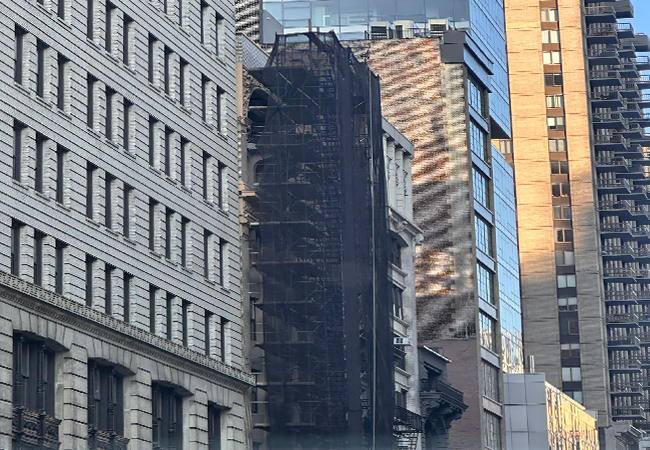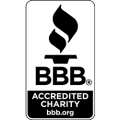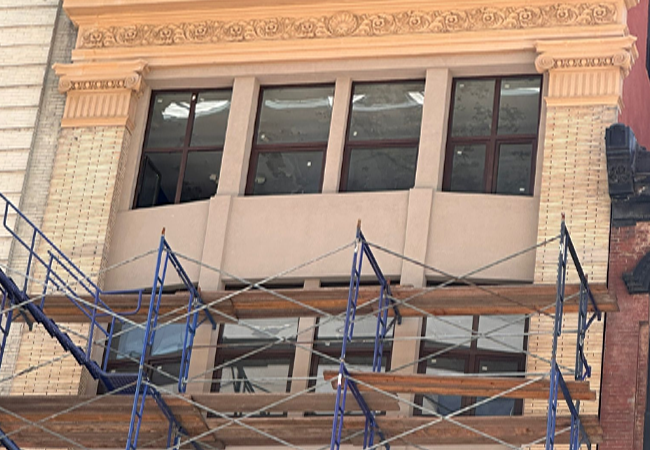Local Law 11 Façade Contractor NYC
Professional Local Law 11 contractors in NYC delivering certified façade inspections, DOB-compliant reports, and expert repairs for buildings above six stories. Serving both residential and commercial properties with accuracy and care.

Trusted NYC Local Law 11 Façade Inspection & Restoration Contractor
When it comes to Local Law 11 in NYC, professional and timely action is essential. Our team specializes in façade inspections and exterior restoration for buildings over six stories, helping owners meet legal requirements with confidence. We identify visible and hidden issues such as damaged bricks, cracked masonry, or aging structural elements that may cause violations. Every inspection is conducted by licensed professionals who understand DOB regulations inside and out. By addressing issues early and accurately, we help reduce costly delays and ensure that your property remains safe, compliant, and structurally sound. Building owners and managers trust us for our transparent process and long-term reliability.
We provides full-service Local Law 11 compliance support, including assessment, repair, documentation, and DOB report filing. We handle complex projects involving brick repair, façade restoration, parapet wall adjustments, and more, without cutting corners. Our goal is to make the inspection and repair process smooth for both residential and commercial property owners. With a focus on quality workmanship and code compliance, we make sure your building not only passes inspection but also maintains its value and integrity. Each project is backed by detailed reporting and clear communication, helping you stay prepared for current and future Local Law 11 cycles.
Certified and Verified by Industry Leaders






Benefits of Hire Our Local Law 11 Contractor
Our services help you meet all compliance requirements while saving time and avoiding penalties. We handle inspections, repairs, and filings with complete accuracy.
Avoid DOB Fines and Violations
Fast Turnaround with Certified Experts
Trusted Repairs That Meet Code
Complete Filing and Report Support
How We Work
Site Inspection
We inspect your building’s façade to check for visible damage or compliance issues.
Report & Filing
Our team prepares the inspection report and submits it to the NYC Department of Buildings.
Repairs & Sign-Off
After repairs, we recheck the site and file the final compliance update for DOB approval.
Why Choose Us
We specialize in Local Law 11 inspections, DOB compliance, and full repair support. Our team ensures your building meets NYC safety standards without delays.
Licensed Local Law 11 Inspectors
NYC Building Code Experts
Free Inspection & Repair Quotes
Testimonials
David S.
Reliable, honest, and knowledgeable. They inspected our façade, managed the repairs, and made sure we stayed compliant. Couldn’t ask for a better team.
Samantha D.
We had violations pending and needed urgent help. These guys showed up on time, explained everything clearly, and got the job done right. Highly recommended.
Michael R.
Sardar Restoration made the entire Local Law 11 process stress-free. Their team was professional, quick, and handled everything from inspection to final DOB filing.

Local Law 11 Compliance Starts with a Trusted Team
If your property needs a Local Law 11 inspection or urgent façade repairs, Sardar Restoration Corp is here to help. Our licensed team manages the full process, from on-site assessment to DOB reporting and restoration work. We address cracks, loose masonry, and structural wear with precision, ensuring your building meets NYC safety regulations. With years of experience handling both residential and commercial properties, we provide timely service, clear communication, and code-compliant results. Our goal is to help you avoid violations, pass inspections, and protect your investment with confidence.
Frequently Asked Questions
NYC Local Law 11, also called the Facade Inspection and Safety Program (FISP), requires buildings over six stories in New York City to undergo regular exterior wall and facade inspections to ensure public safety.
All property owners of buildings taller than six stories must comply by having their exterior walls inspected and reports submitted to the Department of Buildings.
The inspection reviews all exterior walls, parapets, balconies, fire escapes, window sills and lintels, and any other elements that could pose a danger to the public.
Local Law 11 inspections must be conducted every five years according to your building’s designated filing period.
If unsafe conditions are found, you must complete the necessary repairs immediately and have them re-inspected to close the violation.
Yes. Failure to comply with Local Law 11 results in daily fines and penalties until the necessary repairs and filings are completed.
We provide complete Local Law 11 compliance services including inspections, report filings, and all necessary facade repairs to meet DOB standards.
Yes, only a Professional Engineer (PE) or Registered Architect (RA) licensed in New York can perform the inspection and file the required report.
The initial inspection usually takes a few days. If repairs are required, the timeline will depend on the size and complexity of the work.
We take every precaution to minimize disruption. Repairs are planned to ensure safety and convenience for building occupants and pedestrians.
Yes. From initial inspection and filing to full facade restoration, we handle everything required to keep your building compliant and safe.

